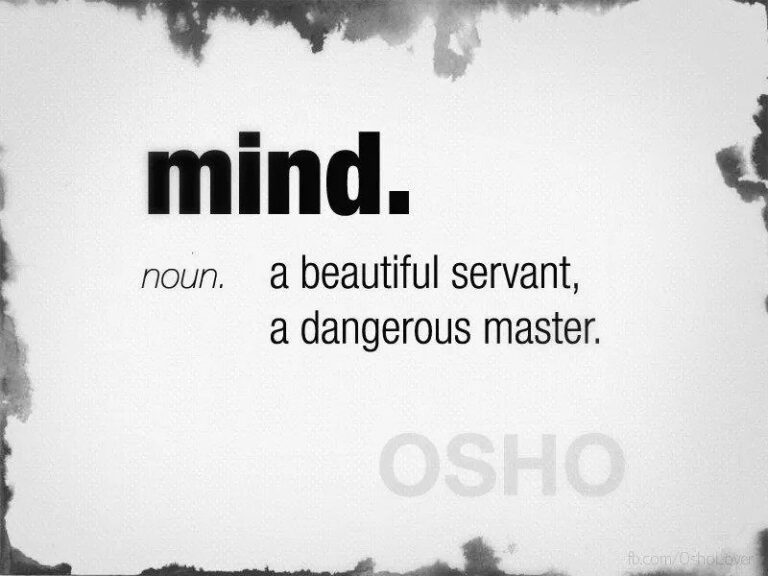“Nothing in the world can bother you as much as your own mind, I tell you. In fact, others seem to be bothering you, but it is not others, it is your own mind.” ~ Sri Ravi Shankar
Our mind is probably the most powerful tool that we could ever own. In fact, our entire life is dependent upon our thoughts about it. Whether we have a good life, a mediocre life, or a terrible life is not so much contingent on the actual circumstances of our lives, but in our thoughts pertaining to the circumstances.
For example, two people can be watching the exact same movie, one person can focus on the bad acting of one of the characters and let that ruin the entire movie for them, while the other one is focused on the amazing music soundtrack and appreciates the costumes and set design.
Both people experienced the exact same movie, but only one enjoyed themselves. Such is our lives. And yes, it is true that no two people will have the same experience about the movie, but the principal still works the same.
Our experience of life is based on our perception of it, which is formed from our beliefs, which are based on our thoughts and which ones we give the most energy and attention to. When we never question our belief systems or go inward for self reflection, we can say that we are letting the mind make use of us. Our minds are running amok and dictating our lives without being questioned.
Once we begin to recognize our thought patterns and the reasons behind our behavior we can start making use of our minds. We can determine what thoughts and beliefs to give our energy to and which ones to discard.
So how do we know what we are doing? How exactly can we tell if our minds are making use of us, or we are making use of our minds? Below are five ways to determine if the mind is your master or slave.
5 indicators that your mind is your master or slave:
1) You believe everything it says
“The day you decide that you are more interested in being aware of your thoughts than you are in the thoughts themselves – that is the day you will find your way out.” ~ Michael Singer
News flash: You don’t HAVE to believe everything that the little voice in your head says! In fact, the more you observe your thoughts as just thoughts instead of identifying with them, you give yourself the space to give your energy to thoughts that are actually benefiting you.
When we choose to pay our attention to thoughts based in love, acceptance, positivity, and optimism, our experience of life dramatically changes. Remember, hostile people see a hostile world, while loving people see a loving one.
The more often we choose to focus on loving thoughts, we will notice our outer reality begins to shift in order to reflect our new state of mind.
2) You trust your thoughts more than your feelings
Although it may take some practice, getting in tune with how you FEEL about things vs. solely how you THINK about them is the most beneficial thing a person can do in order to hone in on their intuition.
There is a part of you that already knows what choice to make, that already knows what it truly “wants” to do, and already knows what the next move should be, and this part is NOT your mind.
Your mind is constantly taking a “stance” on something. Yes, no, good, bad, right, wrong… it lives for a black and white scenario. The problem with this is as soon as we think we know what decision we are going to make about something, our mind then starts coming up with logical reasoning against it.
So it talks us into one choice, and as soon as we think we are at peace with that choice, it starts talking us out of it. And you can imagine how the insanity ensues. However, our feelings (the way we feel in our heart center) does not and can not lie.
Peace, calm and relaxation is our natural state of being, and the choices that are in our best interest are those that give us a sense of relaxation in our hearts. When a person gets in touch with their feelings and the way their body feels about a particular circumstance rather than what they think about it, their feelings begin to act as an inner compass that never leads them astray.
3) You haven’t taken the time to question your thought patterns or behaviors
Number one step in the art of self-reflection, personal development, and an overall trying to change for the better: you must question, “Why do I do the things I do?” No problem is ever truly “solved” until a person gets to the root of the issue.
The underlying cause behind all of our behaviors is always due to an unhealed emotion or a limited belief system that is causing us to believe something about life that is out of alignment with the truth of the universe. If we never question ourselves, or get really introspective and begin to investigate the “why” behind our behaviors, rest assured that emotional maturity and evolution will be stagnant.
4) You are constantly looking for a deeper meaning & understanding
So this one is tricky because by nature, the mind is always trying to make sense of everything. It’s an automatic thing that every person’s mind does simply just because the mind must have a “logical” explanation behind everything that happens.
However, we can drive ourselves crazy with this. Especially for those of us who are on a spiritual or psychological journey, our appetites for the underlying meaning behind everything often becomes quite insatiable.
The more “understanding” we have about things the more our mind needs to know who, what, when, where, why and how. But, sometimes we must surrender to the mystery of it all. A huge sigh of relief happens when we become ok with not knowing why something happened, or why it happened the way it did, etc…
In our most authentic honesty with ourselves, when we can admit that we don’t know why something happened, we not only free ourselves from the chains of acquiring more “understanding”, but we free up our energy to focus on more productive pursuits rather than just analyzing something to death.
5) Your deeper meaning is always against yourself
A huge indicator as to whether the mind is your master or slave is making use of us is what types of reasons our mind tells us behind things.
One type of person always blames themselves for everything (and not in an empowering way), such as, “I must have manifested this because I am doing things wrong,” or “I must be attracting negative circumstances and people because I’m still not being positive enough,” or even, ” I must not be wealthy, successful, in love or living my dream life yet because there are still lots of things ‘wrong’ with me that I must work on.”
The other type of person always chooses to see the positive perspective on everything.. meaning, they realize that nothing that happens to them is NOT there to serve their best interest.
They realize that all the “bad” circumstances that anyone goes through are not really “bad” at all, but rather the interesting part of their movie where the main character (themselves) gets faced with a challenge and watches how they overcome adversity once again.
This person sees every failure as an opportunity and every circumstance as a blessing in disguise. If your mind is going to be coming up with deeper meanings and reasons why everything is happening anyway, why not choose to see that everything is always working out in your favor? It is.
The universe doesn’t give us a circumstance that isn’t ultimately evolving us into a better version of our former selves and if we choose to see things this way, life becomes an exciting adventure vs. just one disappointment after another.
Research



















 about ourselves and asks us to learn and navigate our path with honesty and integrity. The ideal of spiritual awareness is to detangle us from our own entanglements, to free our intuition from our mental preferences, and allow our instincts to embody the lives our souls deserve.
about ourselves and asks us to learn and navigate our path with honesty and integrity. The ideal of spiritual awareness is to detangle us from our own entanglements, to free our intuition from our mental preferences, and allow our instincts to embody the lives our souls deserve.

